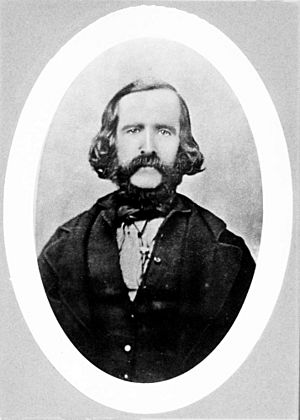Donald McLean (fur trader) facts for kids
Quick facts for kids
Donald McLean
|
|
|---|---|

Donal McLean ca. 1860
|
|
| Born | 1805 Tobermory, Isle of Mull, Scotland
|
| Died | July 17, 1864 (aged 58–59) Chilcotin, British Columbia
|
| Occupation | Fur trader, explorer, cattle rancher |
Donald McLean (born 1805, died 1864) was a Scottish explorer and fur trader. He worked for the Hudson's Bay Company, a famous trading company. Later, he became a cattle rancher in British Columbia. People also knew him as "Samadlin," a name given by First Nations people. He was involved in the Chilcotin War of 1864 and was the father of Allan McLean, who led a group called the "Wild McLean Boys."
Contents
Donald McLean's Early Life and Career
Donald McLean was born in 1805 in Tobermory, Scotland. In 1812, his family moved to Canada. They joined a settlement called Red River Settlement in what is now Manitoba. Life there was very difficult. His father was killed in a conflict in 1816. After this, Donald and his family returned to Scotland.
Joining the Hudson's Bay Company
In 1833, McLean joined the Hudson's Bay Company. This company was very important for fur trading in Canada. He started as an apprentice clerk. In 1835, he explored areas west of the Rockies. He worked at different fur trading posts. These included Fort Colville, Flathead Post, and posts in New Caledonia. He was in charge of Forts Chilcotin, Babine, and McLeod at various times.
Leading Thompson's River Post
McLean became a Chief Trader in 1853. In 1855, he took charge of Thompson's River Post. This post is known today as Kamloops. He helped grow the cattle and horse herds there. He was known for being both fair and strict with local Indigenous peoples.
It was during his time at Thompson's River Post that gold was first found. Local Indigenous people brought gold into the fort. This news was kept quiet at first. But it eventually led to the famous Fraser River Gold Rush.
His Nickname and Resignation
Indigenous people called McLean "Samadlin." This name came from "Sieur McLean," which was how his French-Canadian workers addressed him. McLean was known for his strict methods. He followed a company rule sometimes called "Club Law." Because of his actions and some disagreements, he was called to the company's main office in Victoria in 1860. He then resigned from the company in 1861.
After leaving the company, McLean moved to a ranch he had started. This ranch was near Cache Creek. He lived there with his family. He raised cattle, looked for gold, and ran a roadhouse. His roadhouse was on the Cariboo Road at Lower Hat Creek. Today, this spot is a historical museum.
Involvement in the Chilcotin War
In 1864, the Chilcotin War began. McLean came out of retirement to help. He joined the search for Chief Klattasine. McLean decided to track Klattasine on his own. He explored the areas around Chilko and Taseko Lakes.
Chief Klattasine targeted McLean. This was because of McLean's past strict treatment of the Tsilhqot'in people. Klattasine also knew McLean had shared Tsilhqot'in trails with the militia. On July 17, 1864, McLean was killed by a Tsilhqot'in warrior named Nezunlhtsin. This happened near Choelquoit Lake. Donald McLean's grave is in the Chilcotin, close to where he died.
Donald McLean's Legacy
McLean's ranch is still standing today. It is known as Hat Creek Ranch near Cache Creek. It is a popular historical attraction. Two places are named after him: McLean Lake and Mount McLean. Mount McLean is the highest peak on Mission Ridge.
Donald McLean was married three times and had 11 children.
The Wild McLean Boys
Donald McLean's son, Allan McLean (1855-1881), became famous after his father's death. Allan, along with his brothers Charley and Archie, and a friend, Alex Hare, formed a group. They were known as the "Wild McLean Boys." They were involved in serious crimes in the Nicola Country. They were captured and tried by Chief Justice Matthew Baillie Begbie. In 1879, they were found guilty and later executed in 1881.
One of the "Wild McLean Boys'" sons, George McLean, showed great bravery. In 1917, he was honored for his actions at Vimy Ridge during World War I.
Donald McLean's youngest son from his first marriage, Alexander McLean, owned and ran the Black Pine Ranch in northern Kamloops.
Many of Donald McLean's descendants are still around today. Mel Rothenburger, a former mayor of Kamloops, is one of them. He is a writer who has written books about British Columbia's history, including the Chilcotin War and the Wild McLeans.
 | William M. Jackson |
 | Juan E. Gilbert |
 | Neil deGrasse Tyson |

